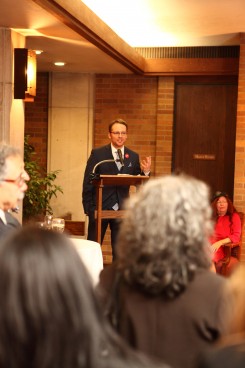“People that are concerned about the environment are often bombarded by bad news… I think that it’s important to remember every once in a while that there has been good done.”
So said author Ryan O’Connor at a talk on campus last Wednesday, March 11 as part of Ecofest, a series of events designed to highlight environmental issues.
O’Connor discussed The First Green Wave, his new book that traces the history of early environmental activism in Ontario.
Central to the book is the story of Pollution Probe, an organization created by students and faculty at U of T in 1969 that still exists today.
O’Connor feels that Pollution Probe achieved many successes by helping solve issues that caught the attention of everyday people, such as with the “Dead Ducks” inquiry into the spraying of pesticides by the city of Toronto.
He began his talk by describing what he sees as the hostility of the current Canadian government to environmentalism, adding that Pollution Probe is an important example of the mainstream nature of the environmental movement in this country.
“When I bring up that point, I’m playing against the conception that many people have that environmentalism is some kind of wingnut idea — but it’s front and centre,” he said.
Peter Middleton, who served as the first executive director of Pollution Probe from 1969 to 1974, was in attendance at the talk. Middleton fielded questions and provided his own views on environmental activism.
“The culture of Pollution Probe when I was there was very much like that of an Internet startup; there was intense communication and intense sharing of ideas,” said Middleton.
Riley McCullough, University of Toronto Students’ Union vice-president, university affairs, and former sustainability commissioner, says O’Connor’s talk was important because of its relevance to U of T history and to environmental activism.
“We want to provide options so that students realize the environment does connect to everything,” says McCullough.


